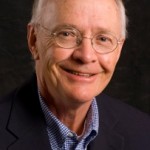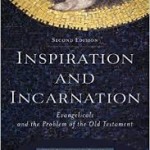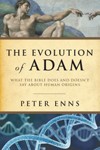 This past Saturday, I gave a paper at the northeast regional meeting of the Evangelical Theological Society, which met on the campus of Alliance Theological Seminary, Nyack, NY. I was asked to talk about my book The Evolution of Adam: What the Bible Does and Doesn’t Say about Human Origins
This past Saturday, I gave a paper at the northeast regional meeting of the Evangelical Theological Society, which met on the campus of Alliance Theological Seminary, Nyack, NY. I was asked to talk about my book The Evolution of Adam: What the Bible Does and Doesn’t Say about Human Origins. It’s no surprise that how I answer this question (Adam is not a historical person) is not in step with how mainstream evangelicalism tends to handle it (Adam definitely is, in some sense, historical). Still, I had a wonderful time, and the discussion afterwards was honest and cordial.
I decided to approach this paper by simply laying out what I think and why I think it–sort of a “here’s where I’m coming from” vibe rather than laying out a position that others should come to. Below, for those interested, are the bullet points of the paper.
- My starting point for how I handle this issue of Adam is twofold: (1) I accept the overwhelming scientific consensus concerning evolution, and (2) our considerable knowledge of how ancient stories of origins functioned. These factors affect how we read the Adam story and they cannot be dismissed or marginalized.
- It strains credulity to think that, of all ancient peoples with origins stories, Israel alone escaped this story-telling mentality and gave us something approximating “history” or “science” in the modern sense.
- The tensions between evolution and evangelicalism are real and cannot be “fixed” by simply “grafting” evolution onto evangelicalism. The two most common ways of doing that are by (1) making Adam and Eve into a pair of hominids chosen by God to be the “first,” and (2) making Adam and Eve a “gene pool” of the earliest hominid group, according to genetic studies.
- Both of these options fail because they are ad hoc, i.e., made up to support a position once wishes to maintain. A more spiritually and intellectually satisfying way forward is to leave aside ad hoc explanations and take a more exploratory, dialogical approach to solving the issue.
- Neither literalism nor inerrancy should be given the status of default positions of orthodoxy. They are themselves theories of how the Bible works that are as open to scrutiny as any.
- Inerrancy in particular has a difficult time accounting for how the Bible looks so “untended” and “misbehaved” by inerrantist standards.
- An incarnational model of Scripture
, though hardly the last word, is a better way of accounting for how the
 Bible behaves than an inerrantist model (and C. S. Lewis wasn’t an inerrantist).
Bible behaves than an inerrantist model (and C. S. Lewis wasn’t an inerrantist). - A well-rounded approach to addressing the Adam issue is the metaphor of a trialogue of three voices: historical context, canonical context, and Christian tradition. None of these voices is dominant or the judge over the others, including “Christian tradition.”
- The historical context includes ancient origins stories that “calibrate” how Genesis and Paul should be read. The canonical context is three levels: exegetical, Old Testament, and New Testament, and each adds its own complex of issues to the discussion. Christian tradition refers to the various Christian iterations of the gospel, all of which are provisional, not the final word on the gospel. (Fleshing out the “trialogue” metaphor was probably the longest section of the paper and it brought in a lot of issues I discuss in my book.)
- Theological discomfort should never be the reason for failing to follow through with where the evidence leads.
- I ended with three underlying big-picture theological issues that evangelicalism will need to address more deliberately in coming to terms about Adam: (1) the role that extra-biblical information can and should play in biblical interpretation; (2) whether inerrancy, regardless of how it is nuanced, is set up to handle this issue; (3) evangelicalism’s willingness to be self-critical and accept criticism or seek guidance from Christian traditions who handle the Adam issue differently.
Two things were clear to me as the day progressed: (1) Evangelicalism has a number of big questions ahead of it for addressing evolution, and I am not sure the evangelical system is designed to move forward without a lot of soul searching and discomfort; (2) Already among their ranks is a critical mass of thoughtful, yet quiet, people who are eager to find ways to move beyond the current impasse.
Time will tell how this will pan out.












